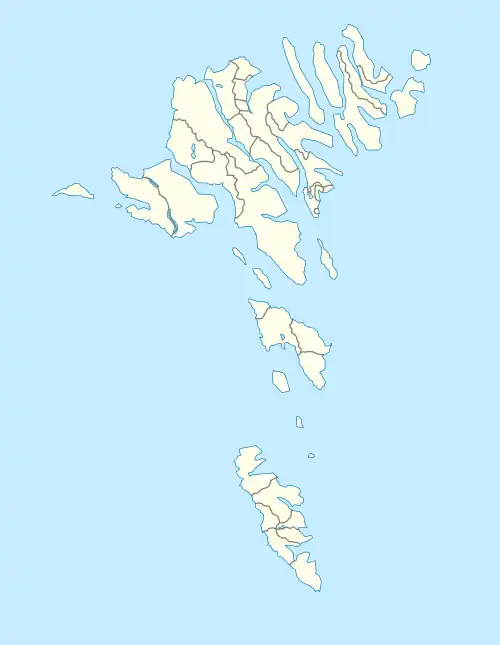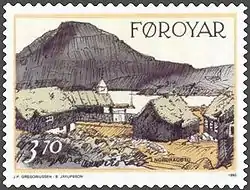Norðragøta
Norðragøta (Danish: Nordregøte), also just referred to as Gøta, is a village on Eysturoy island, Faroe Islands.
Norðragøta | |
|---|---|
Village | |
 Norðragøta in October 2004 | |
 Norðragøta Location in the Faroe Islands | |
| Coordinates: 62°12′3″N 6°44′27″W | |
| State | |
| Constituent country | |
| Island | Eysturoy |
| Municipality | Eysturkommuna |
| Population (September 2023)[1] | |
| • Total | 662 |
| Time zone | GMT |
| • Summer (DST) | UTC+1 (EST) |
| Postal code | FO 512 |
| Climate | Cfc |
Overview

The municipality of Gøta (Gøtu kommuna) was a municipality until 1 January 2009 when it merged with Leirvík into Eysturkommuna. Gøta consists also of the villages Gøtueiði, Gøtugjógv and Syðrugøta. The village lies on Eysturoy's east coast at the bottom of the inlet Gøtuvík. There is a museum called Gøtu Fornminnisavn with the famous house Blásastova. The wooden church in the centre of the village is from 1833.
Gøta is a place of great importance in the history of the Faroe Islands. One of the key figures in the Icelandic saga, Færeyinga saga, called Tróndur í Gøtu (Old Norse: Þrǫ́ndr í Gǫtu) lived here. Tróndur was a heathen Viking-chief who ruled all of the islands for a period of time. In the narrative, Tróndur is depicted as the antagonist, juxtaposed against the protagonist, Sigmundur Brestisson. Sigmundur played a pivotal role in the Christianization of the Faroe Islands on behalf of the King of Norway.
Sports
The most popular pastime in Norðragøta is football. The local football team is Víkingur Gøta, formerly known as Gøtu Ítróttarfelag. They play their home games at the Serpugerði Stadium.
Music
Gøta is home to G! Festival, one of the largest music festivals in the Faroe Islands.
Faroese stamps showing Norðragøta
Old houses in Norðragøta
Issued on 5 October 1992, the artist was Jákup Pauli Gregoriussen.
 FR 231: Hjá Glyvra Hanusi
FR 231: Hjá Glyvra Hanusi FR 232: Húsini hjá Peri
FR 232: Húsini hjá Peri FR 233: Blásastova (today a museum)
FR 233: Blásastova (today a museum) FR 234: Jákupsstova
FR 234: Jákupsstova
- Text for the stamp edition on stamps.fo: Old Houses in Noðragøta
- Note the web site of the museum: Blasastova.fo
Church of Gøta
The new church of Gøta, issued: 23 September 2002. These were also the Christmas stamps for that year.
 FO 425: Gøtu kirkja
FO 425: Gøtu kirkja FO 426: Inside the church. Interior art by Tróndur Patursson
FO 426: Inside the church. Interior art by Tróndur Patursson
Text on stamps.fo:
See also
References
- Population, municipalities and villages Statistics Faroe Islands
External links
- Faroeislands.dk: Gøta Images and description of all cities on the Faroe Islands.
- Blasastova.fo - museum
- Gota.fo - official homepage (only in Faroese)